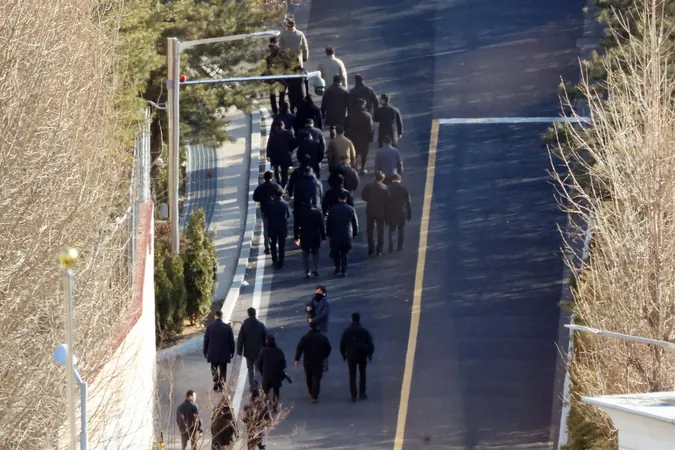
South Korean Investigators Stymied in Arrest Attempt of Ex-President Yoon Suk Yeol
2025-01-03
Author: Siti
Introduction
In a dramatic turn of events, South Korean investigators were unable to execute an arrest warrant for former President Yoon Suk Yeol on January 3. This unprecedented situation arose when the Corruption Investigation Office for High-ranking Officials (CIO) attempted to apprehend him amidst a gathering of supporters outside his residence in Seoul.
Background
Yoon, who is currently embroiled in a serious criminal investigation related to his controversial declaration of martial law on December 3, has become a focal point of national discontent and intrigue. His attempts to impose martial law to combat what he termed "anti-state forces" were met with rapid backlash, including a decisive vote from 190 lawmakers who managed to quell his order within hours. The declaration was retracted shortly after, but not before raising alarm across South Korea—a leading democracy in Asia.
The Arrest Attempt
On the fateful day, officials from the CIO arrived at Yoon's gated community not long after dawn, only to be met with obstacles. A bus blocking the driveway delayed their entry, and upon gaining access, they found themselves confronted by security personnel, including troops from the Presidential Security Service (PSS). Reports indicate that the PSS had asserted that investigators were not permitted to conduct searches within the president's home.
Supporters Rally
Amidst this chaos, Yoon's supporters amassed early in the morning, rallying in the hundreds. Their fervor was palpable, with chants of "President Yoon Suk Yeol will be protected by the people" ringing out as they called for the arrest of CIO officials. One supporter even hinted at a willingness to lay down their lives to protect the ex-president. Some attendees held onto the hope that the incoming U.S. president, Donald Trump, would intervene on behalf of Yoon, indicating a tug-of-war not only within South Korean politics but also involving international dynamics.
Ongoing Investigations
The political landscape is further complicated by ongoing investigations into the military and governmental figures involved in the martial law debacle. Two high-ranking military officials have been indicted, while Yoon's former defense minister faces serious charges of insurrection and abuse of power.
Legal Challenges
Adding to the tumult, Yoon's lawyers are contesting the legality of the arrest warrant, claiming that the CIO lacked the necessary jurisdiction under South Korean law. As Yoon remains isolated since his impeachment on December 14, the stakes are high as the Constitutional Court prepares to hear arguments regarding the permanence of his removal from office on January 3.
Conclusion
This unfolding drama raises critical questions about the integrity of South Korea's democratic institutions and the implications of political turmoil amid regional tensions, especially considering the legacy of North Korea and the controversial claims of election tampering that Yoon has put forth in his defense.
Stay tuned as this story develops—will Yoon Suk Yeol manage to dodge justice, or is this the beginning of a pivotal moment in South Korean history?


 Brasil (PT)
Brasil (PT)
 Canada (EN)
Canada (EN)
 Chile (ES)
Chile (ES)
 Česko (CS)
Česko (CS)
 대한민국 (KO)
대한민국 (KO)
 España (ES)
España (ES)
 France (FR)
France (FR)
 Hong Kong (EN)
Hong Kong (EN)
 Italia (IT)
Italia (IT)
 日本 (JA)
日本 (JA)
 Magyarország (HU)
Magyarország (HU)
 Norge (NO)
Norge (NO)
 Polska (PL)
Polska (PL)
 Schweiz (DE)
Schweiz (DE)
 Singapore (EN)
Singapore (EN)
 Sverige (SV)
Sverige (SV)
 Suomi (FI)
Suomi (FI)
 Türkiye (TR)
Türkiye (TR)
 الإمارات العربية المتحدة (AR)
الإمارات العربية المتحدة (AR)